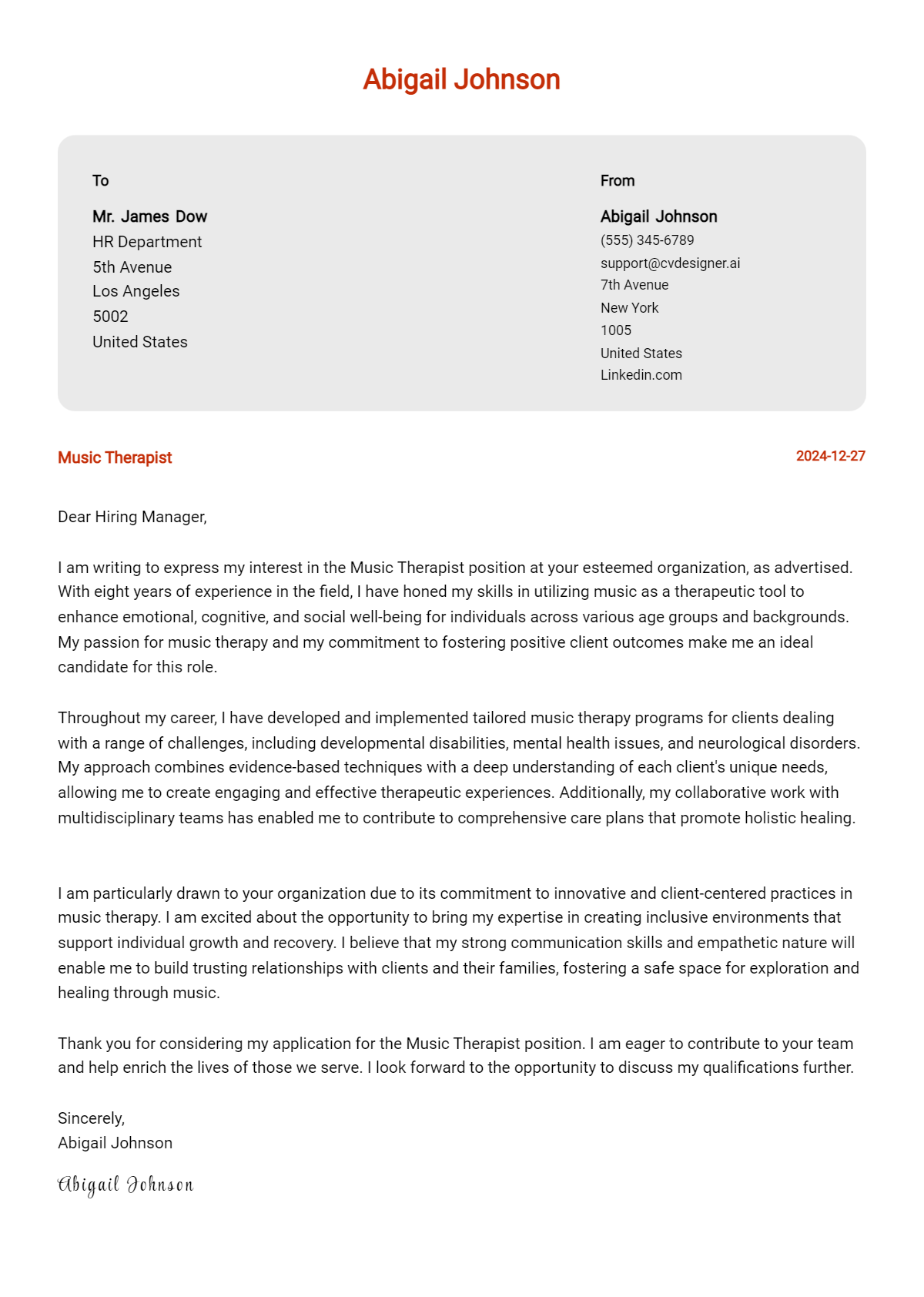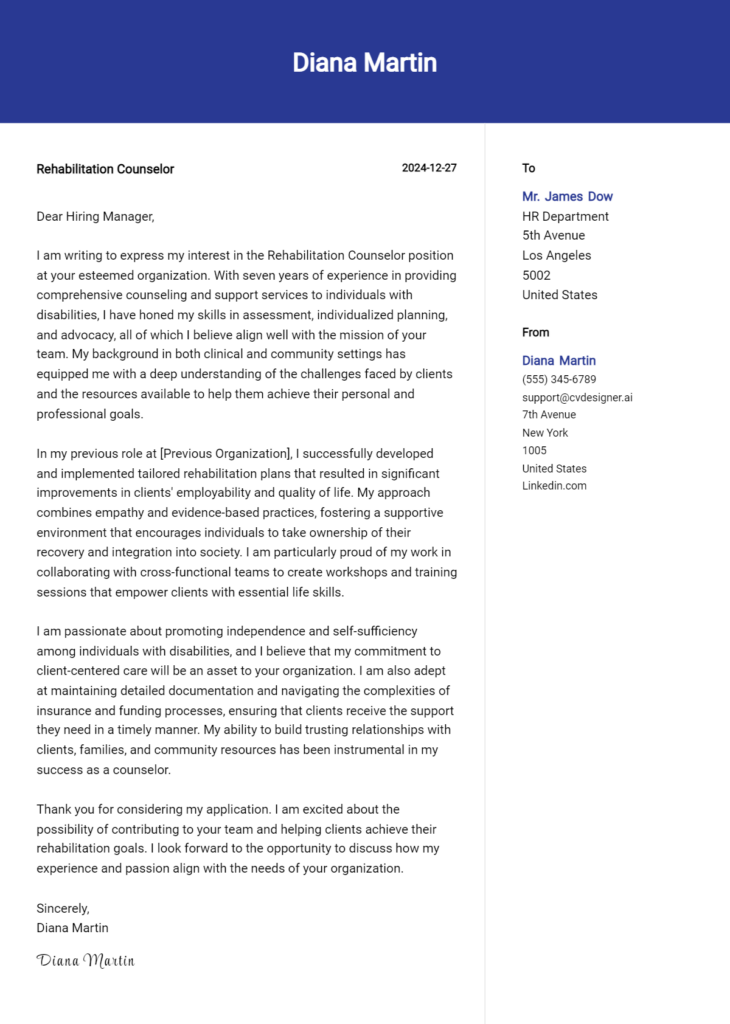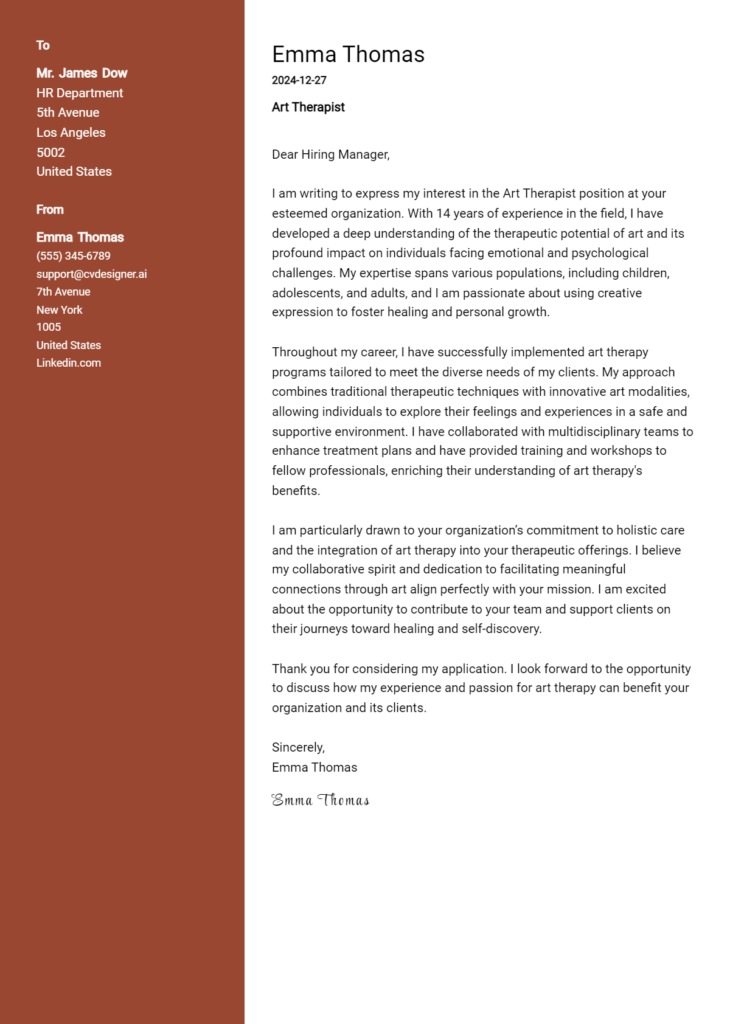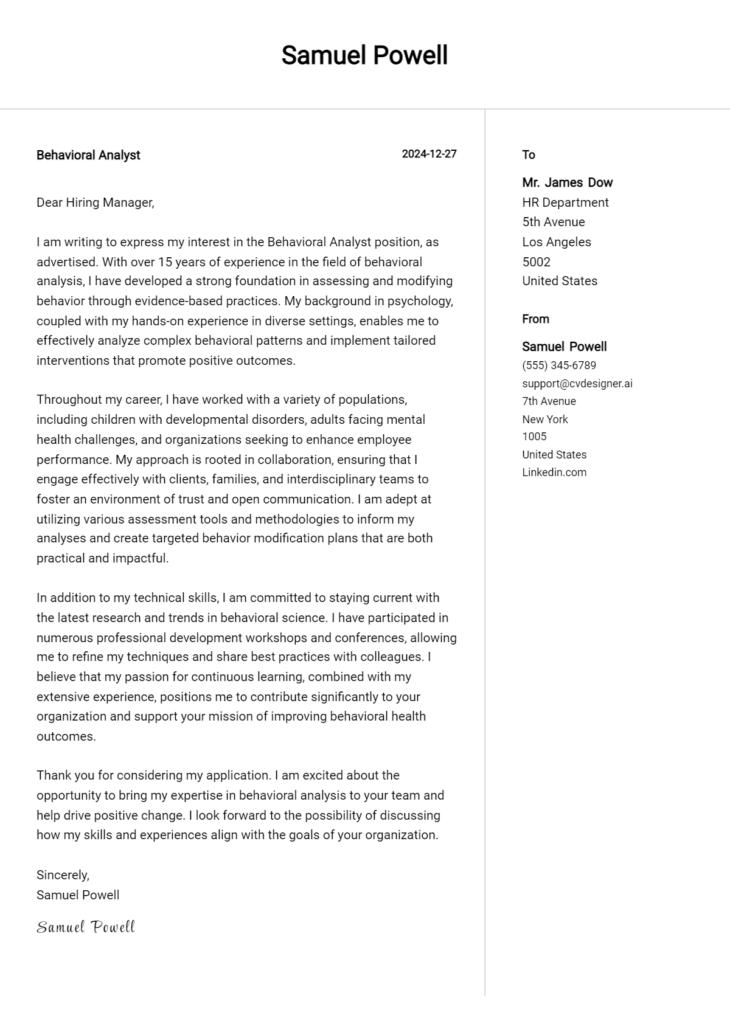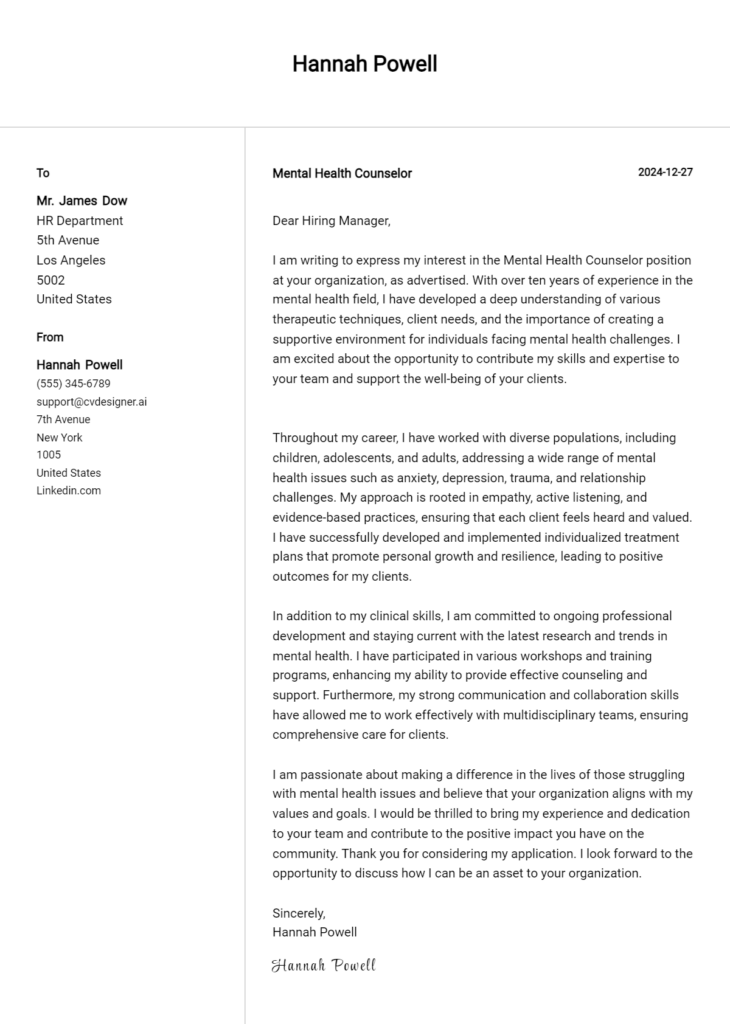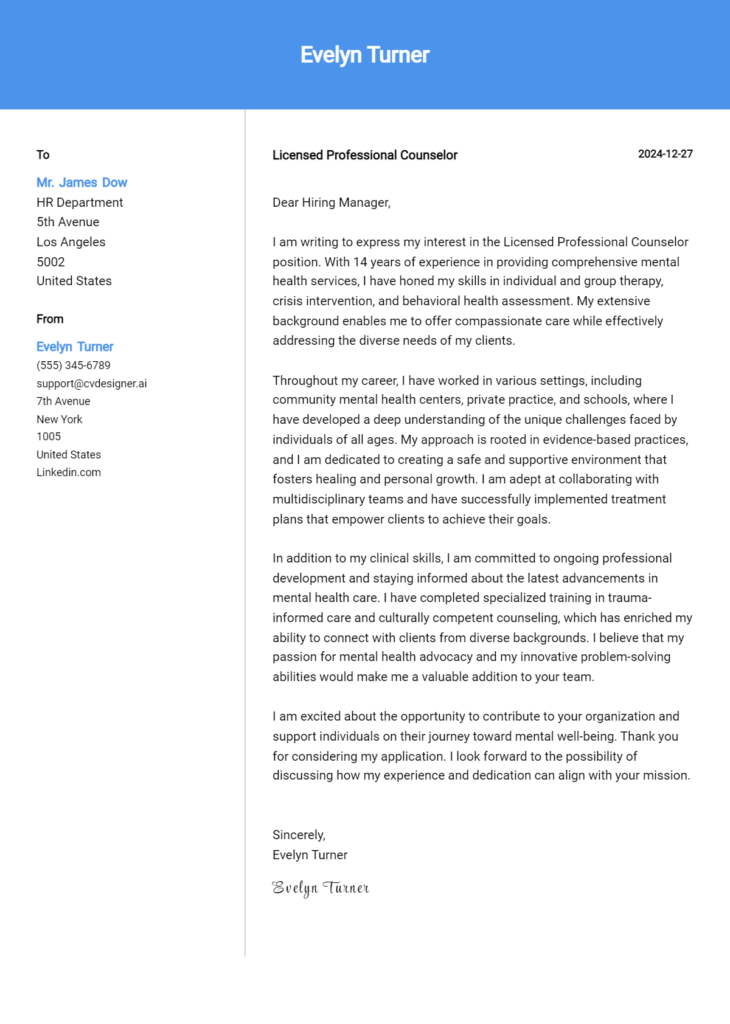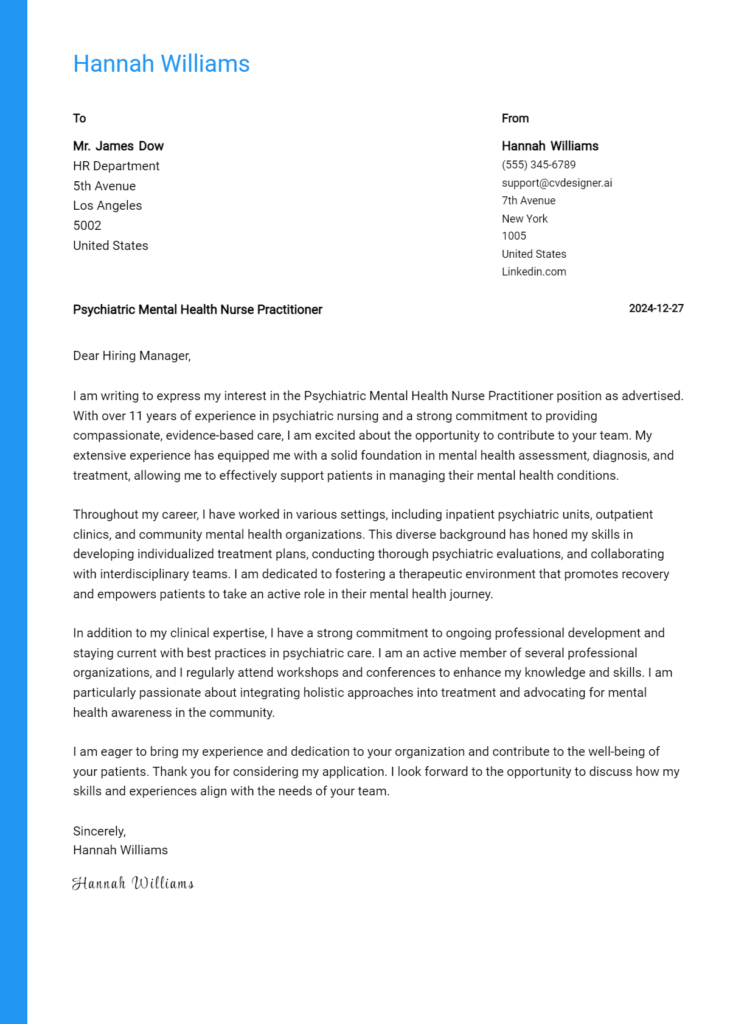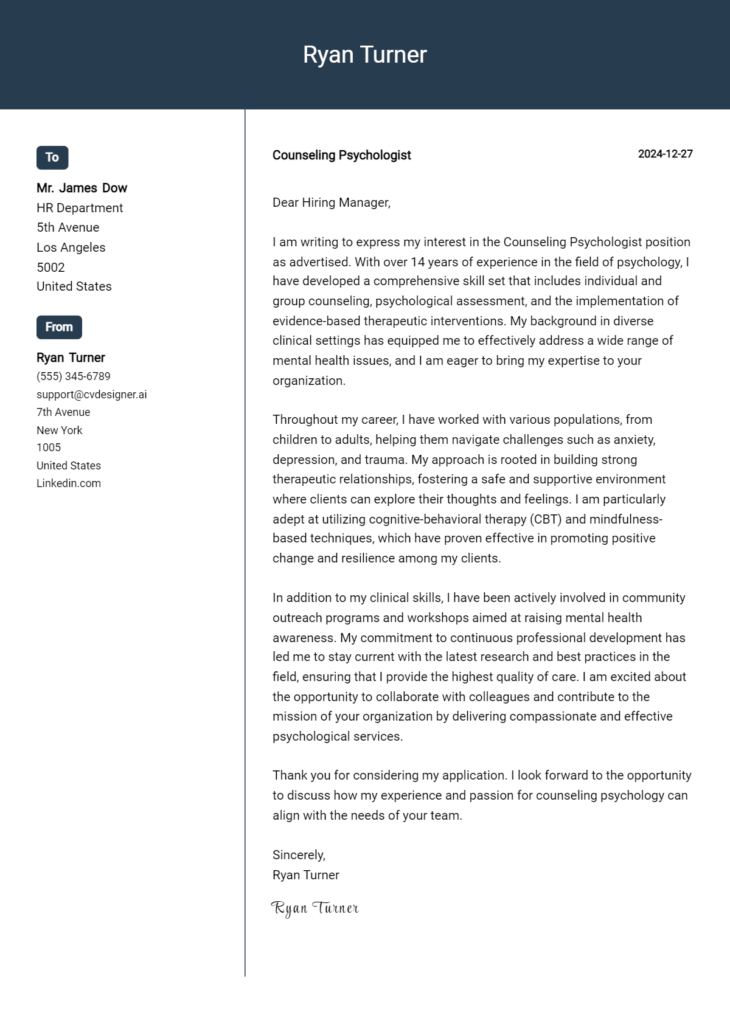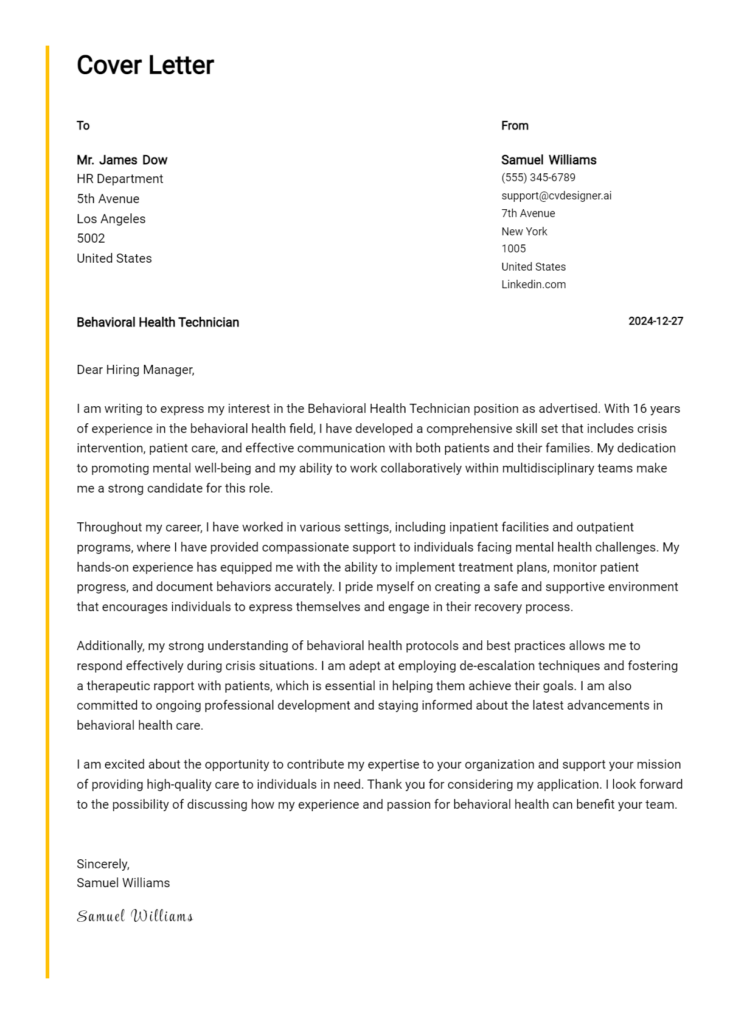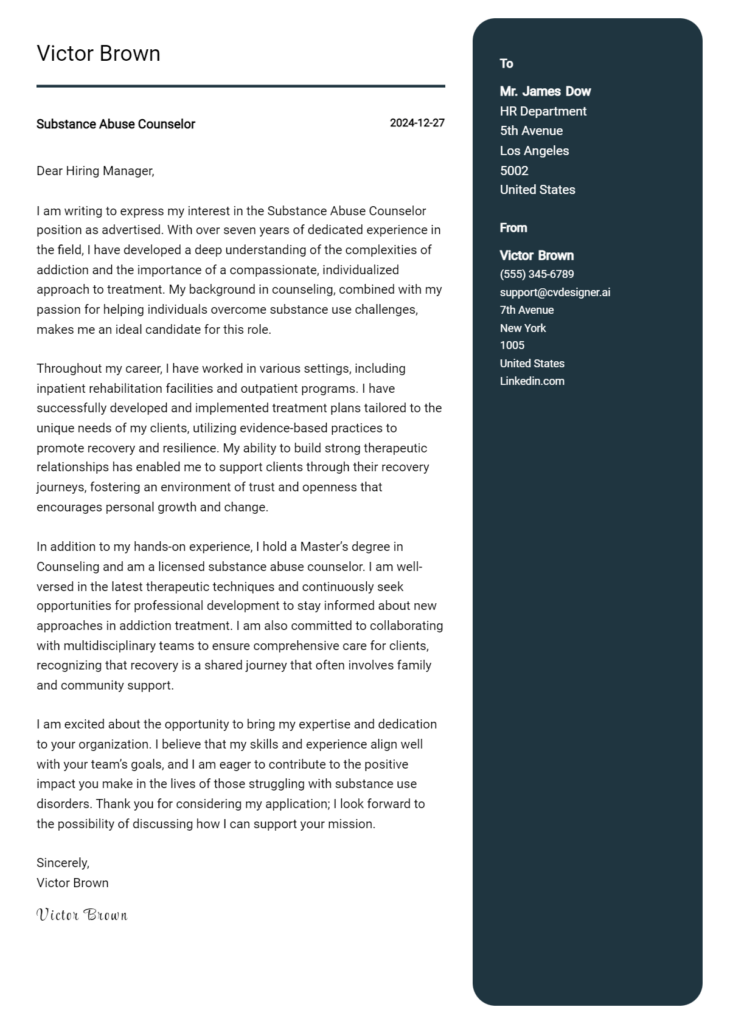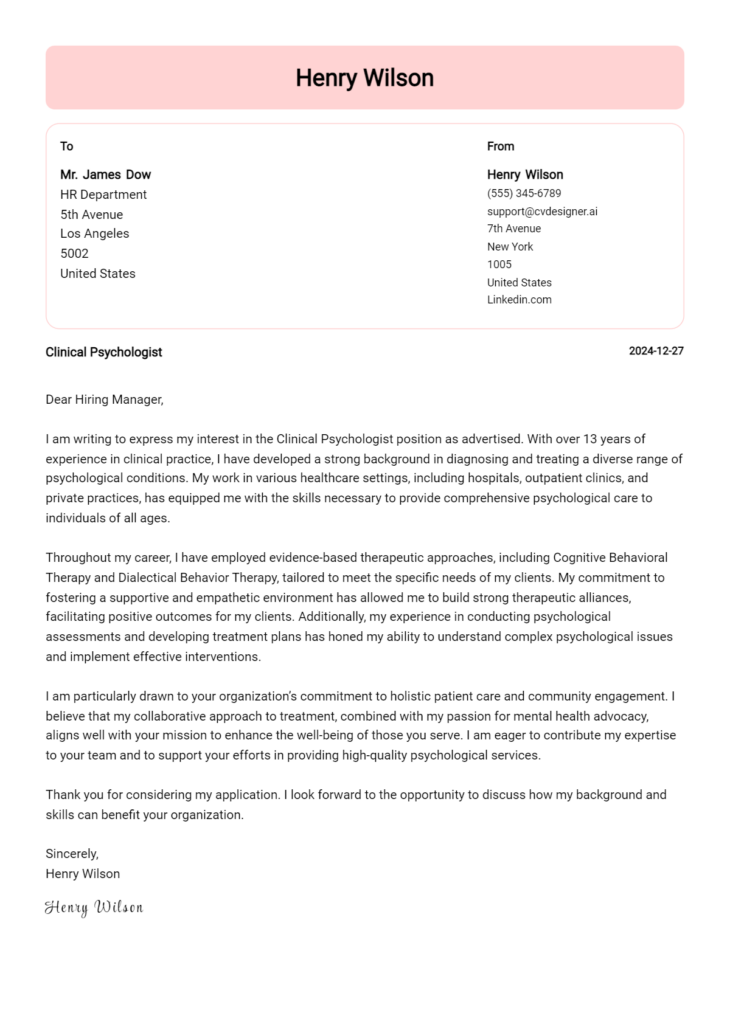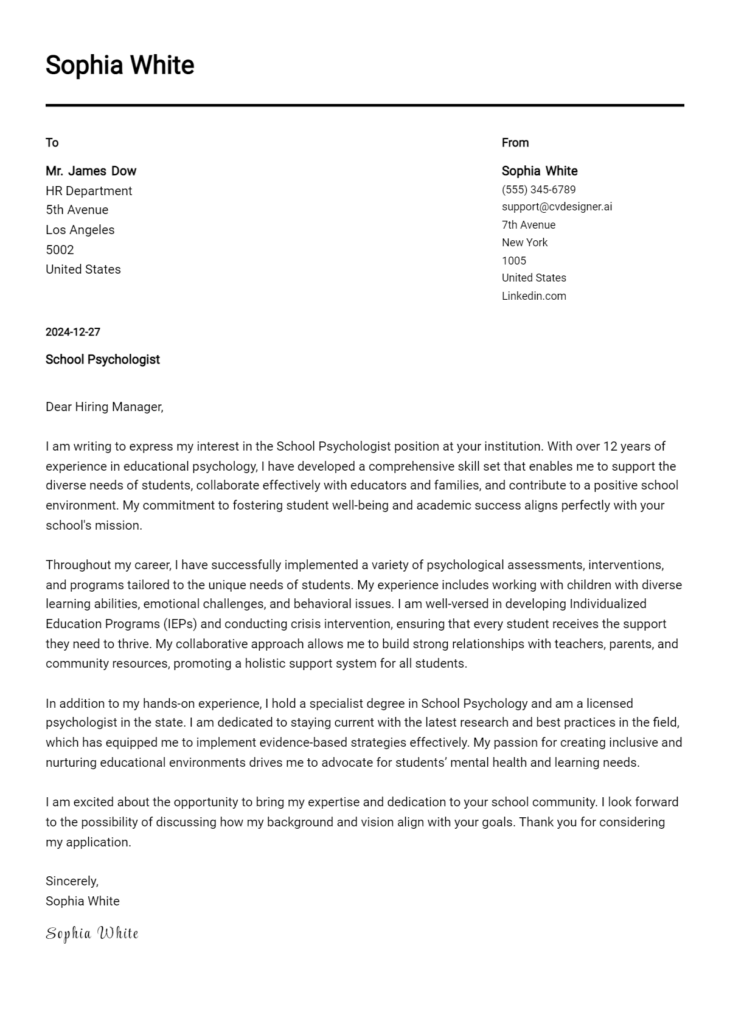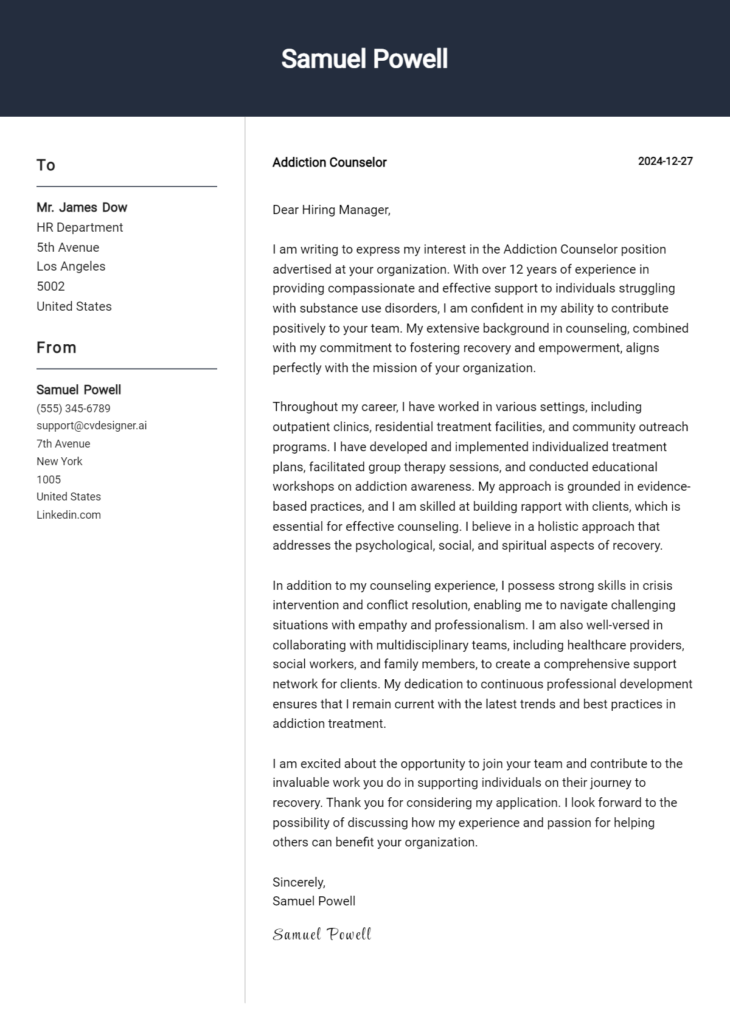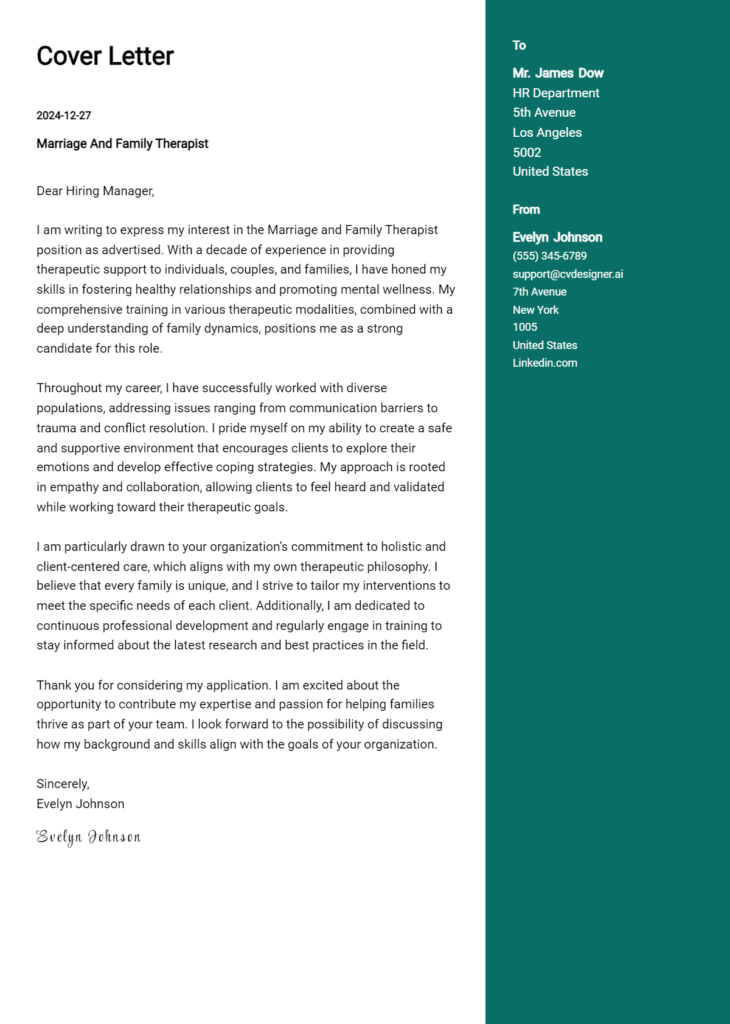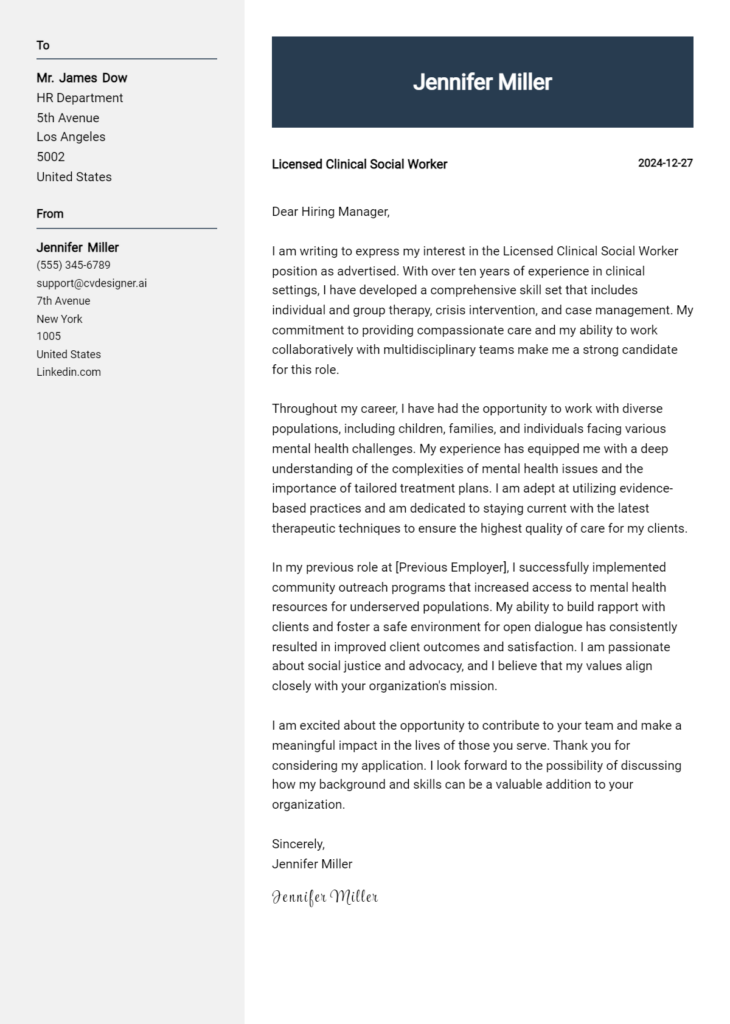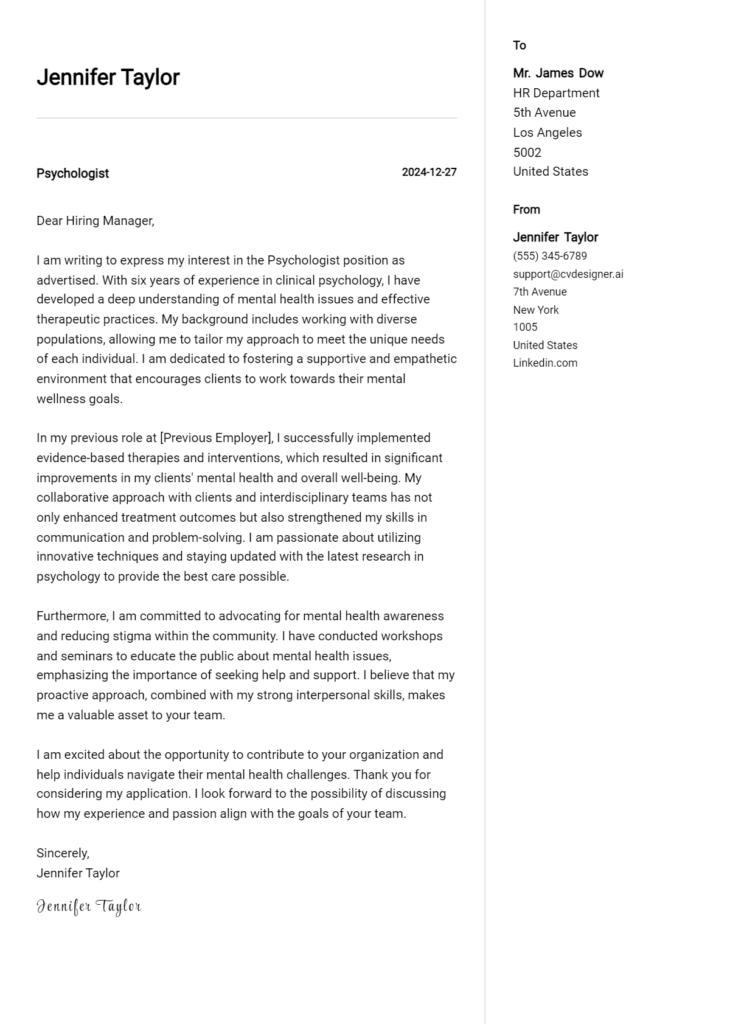Music Therapist Cover Letter Examples
Explore additional Music Therapist cover letter samples and guides and see what works for your level of experience or role.
How to Format a Music Therapist Cover Letter?
Crafting an effective cover letter is essential for Music Therapists, as it not only showcases your qualifications but also reflects your understanding of the therapeutic relationship. The way you format your cover letter can offer insights into your creativity, empathy, and organizational skills—qualities that are vital in the field of music therapy. A well-structured cover letter captures the attention of hiring managers while demonstrating your professional approach to client care.
In this guide, we will outline how to structure your cover letter, providing valuable tips and music therapy-specific examples to aid you in creating a compelling document.
We will focus on the essential components of a professional cover letter, including:
- Cover Letter Header
- Cover Letter Greeting
- Cover Letter Introduction
- Cover Letter Body
- Cover Letter Closing
Each section is crucial in highlighting your unique qualifications and professionalism. Let’s break down each part and explain how to make your Music Therapist cover letter stand out.
Importance of the Cover Letter Header for a Music Therapist
A well-crafted cover letter header is essential for a Music Therapist as it sets the tone for the entire application. It provides the first impression and communicates professionalism and attention to detail. The header should include your contact information, the date, and the recipient's details to ensure clarity and facilitate easy communication. A clear and organized header not only presents you as a qualified candidate but also reflects your ability to maintain structure and clarity—skills that are vital in therapeutic settings.
Strong Example
Jane Doe 123 Harmony Lane Musical City, ST 12345 janedoe@email.com (123) 456-7890 October 1, 2023 Mr. John Smith Director of Music Therapy Healing Hearts Therapy Center 456 Melody Road Musical City, ST 12345
Weak Example
Jane jane@email.com 10/1/23 John
The Importance of a Strong Cover Letter Greeting
The greeting of a cover letter is crucial as it sets the tone for the entire document and reflects the professionalism of the applicant. A well-crafted greeting demonstrates respect and personalization, showing that the candidate has taken the time to research and address the hiring manager directly. This small but significant detail can help establish a connection with the reader and create a positive first impression. To avoid generic greetings, it's essential to take a moment to find out the name of the hiring manager or the person in charge of recruitment. This effort not only showcases your genuine interest in the position but also distinguishes you from other applicants who may use a one-size-fits-all approach.
When crafting your greeting, consider the following tips:
- Always strive to personalize your greeting with the recipient's name.
- If the name isn't readily available, try to find it through the company's website, LinkedIn, or by calling the office.
- Avoid using overly formal greetings that may come off as insincere.
Here are some examples of strong and weak greetings for a Music Therapist cover letter:
Strong Greeting Example
Dear Ms. Johnson,
Weak Greeting Example
To Whom It May Concern,
Importance of a Well-Crafted Cover Letter Introduction for a Music Therapist
A compelling cover letter introduction is crucial for a Music Therapist, as it sets the tone for the entire application and can significantly influence the hiring manager's first impression. An effective introduction should not only capture the reader's attention but also convey the candidate's enthusiasm for the role while highlighting relevant skills or achievements that make them a strong fit. By doing so, the candidate can create a memorable entry point into their application, paving the way for a deeper exploration of their qualifications. Below are examples of both strong and weak cover letter introductions for a Music Therapist position.
Strong Example
Dear [Hiring Manager's Name], As a passionate and dedicated Music Therapist with over five years of experience working with diverse populations, I am excited to apply for the Music Therapist position at [Company Name]. My commitment to using music as a therapeutic tool to foster emotional and cognitive growth has been recognized through successful interventions that led to significant improvements in my clients' well-being. I am eager to bring my expertise in personalized music therapy techniques and my collaborative spirit to your esteemed team.
Weak Example
Dear [Hiring Manager's Name], I am writing to apply for the Music Therapist position. I have some experience in music therapy and think it could be a good job for me. I have done a few projects in the past, and I hope you consider my application.
Purpose of the Cover Letter Body for a Music Therapist
The cover letter body for a Music Therapist serves as a crucial platform for candidates to articulate their unique blend of skills, experiences, and the value they can bring to a prospective employer. This section allows the applicant to connect their professional journey with the specific needs of the organization. By highlighting specific projects or accomplishments, candidates can demonstrate their effectiveness in using music as a therapeutic tool and their ability to positively impact clients’ well-being. A well-structured cover letter body not only showcases the therapist's qualifications but also illustrates their passion for the field and commitment to enhancing the lives of others through music.
Strong Example
Dear [Hiring Manager's Name], I am excited to apply for the Music Therapist position at [Company Name] as advertised on [Job Posting Source]. With over five years of experience working in diverse clinical settings, I have successfully implemented music therapy programs that have significantly improved the emotional and psychological well-being of my clients. For instance, while working at [Previous Organization], I developed a program that combined songwriting and improvisation techniques, which resulted in a 30% improvement in mood scores among participants within three months. Additionally, my collaboration with a multidisciplinary team has enabled me to create tailored interventions that address individual needs, fostering a supportive environment for healing and growth. I am eager to bring my expertise in music therapy to [Company Name] and contribute to your mission of enhancing the quality of life for your clients. Sincerely, [Your Name]
Weak Example
Dear [Hiring Manager's Name], I am applying for the Music Therapist position at [Company Name]. I have worked in music therapy for a while and have done some projects. I think I can help your clients feel better. I like music a lot and believe it can really help people. I hope you will consider my application. Best, [Your Name]
Importance of the Cover Letter Closing for a Music Therapist
The closing paragraph of a cover letter is crucial for a Music Therapist as it serves to summarize qualifications, express enthusiasm for the position, and encourage the hiring manager to take the next steps, such as reviewing the resume or scheduling an interview. A strong closing leaves a lasting impression and reinforces the candidate's fit for the role, while a weak closing may fail to convey confidence or urgency, potentially diminishing the overall impact of the application.
Strong Example
Thank you for considering my application for the Music Therapist position at your esteemed organization. With a Master's degree in Music Therapy and over five years of experience working with diverse populations, I am excited about the opportunity to contribute to your team. I am particularly drawn to your commitment to holistic care and believe my skills align well with your mission. I look forward to the possibility of discussing how my background can benefit your clients. Please feel free to review my resume, and I hope to schedule an interview soon. Thank you again for your time and consideration.
Weak Example
I hope you like my application. I have done some music therapy before, and I think it would be a good job for me. You can look at my resume if you want. I guess we can talk later.
These tips are designed to help candidates craft an effective cover letter for a Music Therapist position. A well-written cover letter is crucial in making a strong first impression, and it should effectively communicate not only your passion for music therapy but also your technical skills, problem-solving abilities, teamwork experience, and commitment to continuous learning. By incorporating these elements, you can enhance your application and stand out to potential employers.
Tips for Crafting an Effective Cover Letter for Music Therapists
Showcase Your Technical Skills
Begin by highlighting your relevant technical skills that are essential for a Music Therapist. This may include proficiency in various musical instruments, knowledge of music theory, and familiarity with therapeutic techniques. Be specific about how these skills have been applied in previous roles or during your training. This can demonstrate your readiness for the position and your ability to positively impact clients.Demonstrate Problem-Solving Abilities
Music therapy often involves addressing unique challenges faced by clients. Illustrate your problem-solving abilities by sharing specific examples of how you've adapted your therapeutic approach to meet individual needs. Discuss any innovative strategies you've implemented that have led to successful outcomes in your practice, showcasing your creativity and critical thinking skills.Highlight Knowledge of SDLC (Service Development Life Cycle)
While SDLC is commonly associated with software development, it can also apply to the continuous improvement of therapeutic services. Explain your understanding of how to assess client needs, implement therapy plans, and evaluate outcomes over time. This knowledge reflects your commitment to providing high-quality, client-centered care and your ability to contribute to the ongoing development of therapeutic services.Emphasize Teamwork Experience
Music therapy often involves collaboration with other healthcare professionals, family members, and community resources. Detail your experiences working in interdisciplinary teams or leading group therapy sessions. Highlight your ability to communicate effectively and contribute to a positive team dynamic, demonstrating that you are a cooperative team player who values collaboration in achieving client goals.Express a Passion for Continuous Learning
The field of music therapy is constantly evolving, and expressing your dedication to professional development can set you apart. Mention any additional training, workshops, or certifications you have pursued to enhance your skills. Discuss your commitment to staying updated on the latest research and trends in music therapy, underscoring your passion for lifelong learning and your drive to provide the best care for your clients.
For additional assistance, consider using cover letter templates to structure your letter effectively or a cover letter builder to streamline the writing process.
Common Mistakes to Avoid in a Music Therapist Cover Letter
Crafting a compelling cover letter is essential for standing out in the competitive field of music therapy. Avoiding common mistakes can significantly enhance your chances of making a strong impression on potential employers. Here are some pitfalls to watch out for:
Generic Greeting: Using a vague salutation like "To Whom It May Concern" can signal a lack of effort. Always try to find the hiring manager’s name for a personal touch.
Lack of Specificity: Failing to tailor your cover letter to the specific job can make your application seem generic. Reference the specific position and organization, and highlight relevant experiences.
Overly Formal Language: While professionalism is vital, overly formal language can come off as stiff. Aim for a conversational tone that reflects your personality as a therapist.
Neglecting the Format: An improper cover letter format can detract from your message. Follow established cover letter format guidelines to ensure clarity and professionalism.
Focusing on Yourself Too Much: While it’s important to discuss your qualifications, remember to emphasize how your skills will benefit the employer and their clients.
Ignoring Proofreading: Spelling and grammatical errors can undermine your credibility. Always proofread your letter or have someone else review it before submission.
Not Including Relevant Experience: Omitting key experiences that showcase your skills as a music therapist can weaken your application. Be sure to include specific examples that demonstrate your impact.
By being mindful of these common mistakes and utilizing helpful resources like cover letter examples, you can create a strong cover letter that enhances your chances of success in the field of music therapy.
Cover Letter FAQs for Music Therapist
What should I include in my cover letter as a Music Therapist?
In your cover letter, begin with a strong opening that captures your passion for music therapy and its impact on clients. Highlight your relevant qualifications, such as degrees, certifications, and any specialized training in music therapy. Include specific experiences where you successfully utilized music to support clients' emotional, cognitive, and social needs. Discuss your understanding of various therapeutic techniques and how you tailor your approach to meet individual client goals. Be sure to convey your enthusiasm for the position and how your background aligns with the organization’s mission and values. Finally, express your desire for an interview to further discuss your qualifications.
How can I demonstrate my skills effectively in a cover letter?
To demonstrate your skills effectively, use concrete examples that illustrate your competencies in music therapy. Describe specific instances where you implemented therapeutic interventions that led to positive outcomes for your clients. For instance, you might detail a case where you used songwriting to help a client express grief or employed rhythmic activities to improve motor skills. Quantify your achievements when possible, such as stating the number of clients you successfully supported or any feedback received. Additionally, mention any collaborative efforts with other healthcare professionals, showcasing your ability to work as part of a multidisciplinary team. This approach provides tangible evidence of your skills and enhances your credibility.
Should I customize my cover letter for each job application?
Absolutely! Customizing your cover letter for each job application is crucial in standing out as a candidate. Tailor your content to reflect the specific requirements and preferences mentioned in the job description. Research the organization’s values, mission, and client population to align your experiences and skills with their needs. For example, if the job emphasizes working with children, highlight your relevant experiences in pediatric music therapy. Additionally, address the hiring manager by name if possible, and show genuine interest in the organization’s work. A personalized cover letter demonstrates your dedication and helps you connect with potential employers on a deeper level.
How long should my cover letter be?
A cover letter for a Music Therapist position should ideally be one page long, consisting of three to four paragraphs. This length is sufficient to convey your key qualifications and experiences without overwhelming the reader. Begin with a strong introduction, followed by a section that outlines your relevant skills and experiences. Use specific examples to illustrate your effectiveness as a music therapist. Conclude with a brief summary of your enthusiasm for the position and a call to action, inviting the employer to discuss your application further. Keeping your cover letter concise and focused will help maintain the reader's attention and leave a lasting impression.
Build your Cover Letter in minutes
Use an AI-powered cover letter builder and have your letter done in 5 minutes. Just select your template and our software will guide you through the process.

